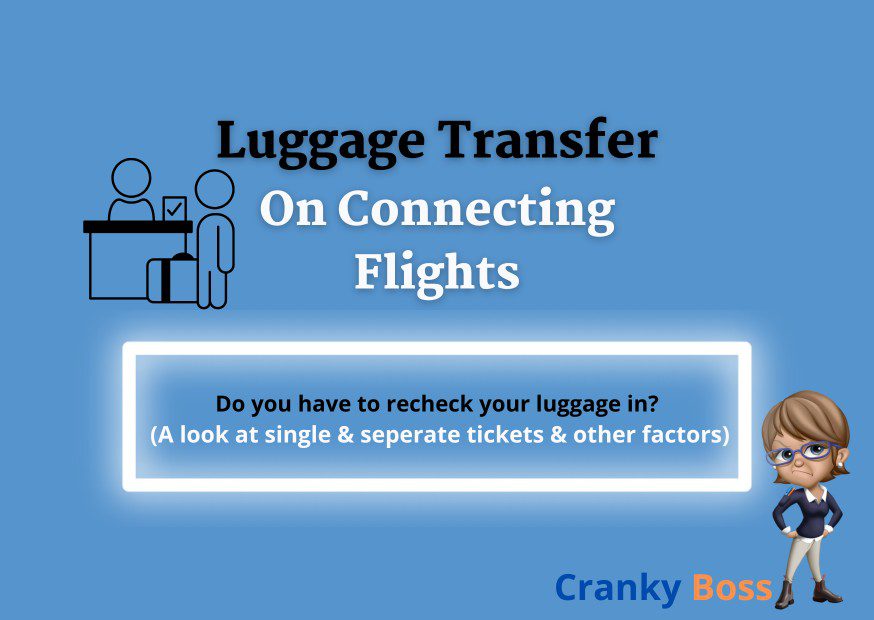A common question travellers have. The answer to this question is: It depends.
When flying on a connecting flight, whether or not you need to recheck your luggage largely depends firstly on your first point of entry. It also depends on your ticket and airline policies. Let’s take a look at some of the things that can determine where or not you need to recheck your bags on a connecting flight.
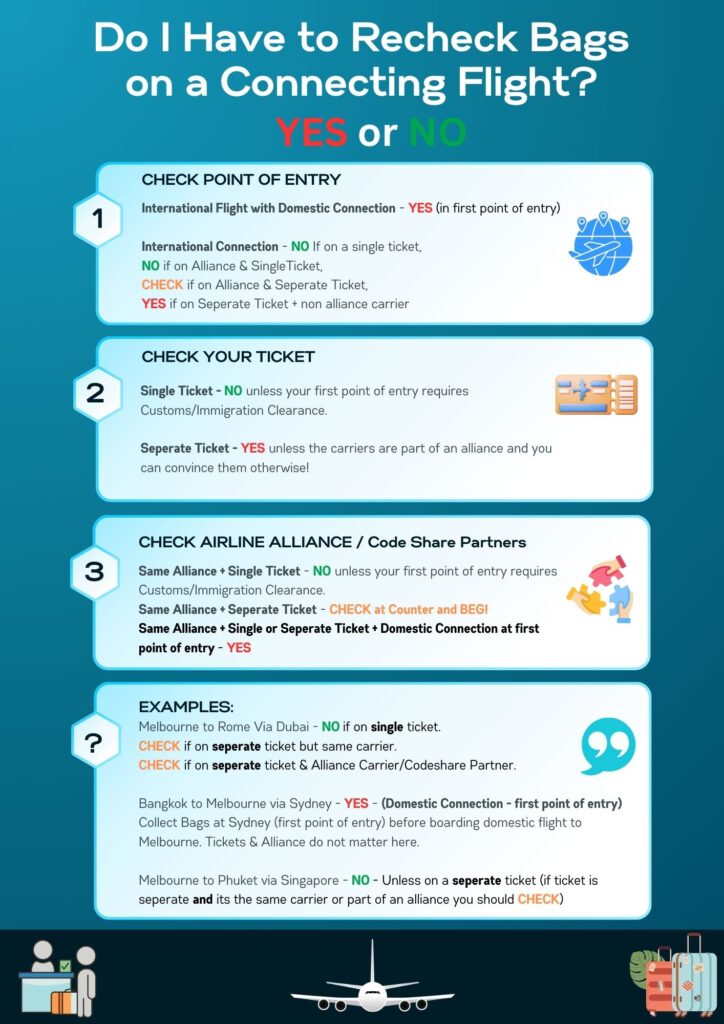
Do I Need to Recheck in My Luggage on a Connecting Flight?
1. CHECK POINT OF ENTRY
The first thing we must determine is your first point of entry and if you are transiting and connecting on to a domestic flight.
If you are passing through a country and connecting on a domestic flight you must clear customs and immigration at your first point of entry. This overrides any other determining factor.
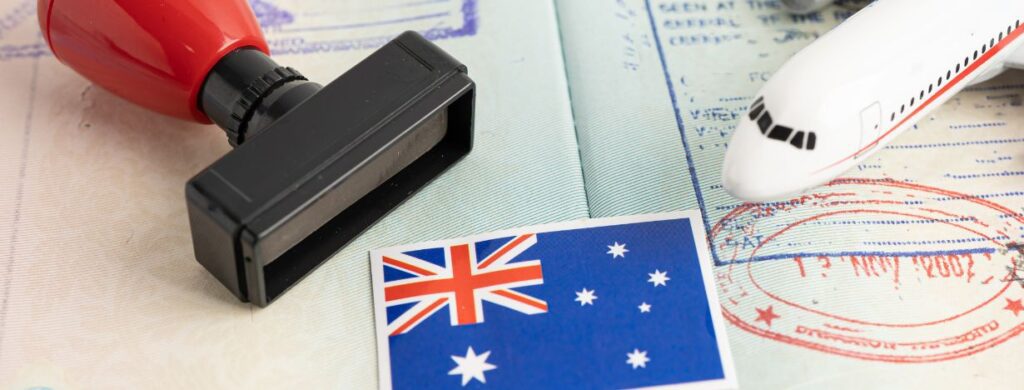
A point of entry is the location where travelers or goods first arrive in a country and undergo border control processes such as customs, immigration, and quarantine. This could be an airport, seaport, or land border crossing.
At a point of entry, travelers are subject to checks to verify their identity, ensure they meet visa and entry requirements. Furthemore they declare any goods or items they are bringing into the country. The point of entry is also where authorities enforce laws and regulations regarding immigration, customs duties, and biosecurity. This is to protect the country’s economy, security, and environment.
Example of Point of Entry
For example, if you’re flying internationally to Australia, the first airport you land at in Australia—say Sydney or Melbourne—becomes your point of entry. This is where you will clear immigration and customs before continuing your journey.
When someone arrives in Australia from overseas and is connecting to another city, they must clear immigration and customs at their first port of entry, even if they have a connecting flight.
Point of Entry Process:
- First Port of Entry: Passengers arriving in Australia must go through immigration and collect their checked luggage at the first port of entry (e.g., Sydney, Melbourne, etc.). This is because Australia requires all arriving passengers to clear customs and quarantine upon their initial entry into the country.
- Customs and Quarantine: After collecting their bags, passengers proceed through customs and quarantine inspection. Australia has strict biosecurity laws, so even if your bags are checked through to your final destination, they must be inspected here.
- Rechecking Bags for Domestic Flight: After clearing customs, passengers need to drop off their bags again at the transfer desk for their domestic connecting flight. Some airports in Australia have dedicated domestic transfer facilities, making this process quicker and easier.
- Connecting to a Domestic Flight: Once the bags are rechecked, passengers proceed to their domestic terminal (if needed) and catch their connecting flight to their final destination.
In contrast, many European airports allow you to pass through without needing to touch your checked bags during the layover, making the journey smoother.
If you are traveling with kids, this becomes especially important. Rechecking bags with little ones in tow can add stress. For those flying solo, this could be a source of travel anxiety, especially if the connection time is tight. It’s always advisable to confirm with your airline in advance, especially when flying internationally or with a mix of airlines.
2. CHECK YOUR TICKET
Single Ticket
If you are flying on a single ticket, your luggage is typically tagged through to your final destination. You don’t need to collect and recheck it during the connection (unless you are arriving in a first port of entry as mentioned in the first point).
What is a single ticket?
A single ticket refers to a travel itinerary where all your flights are booked under one reservation or booking reference, even if you have multiple connecting flights. This means that from your departure point to your final destination, all legs of the journey are treated as one continuous trip by the airline or travel agency.
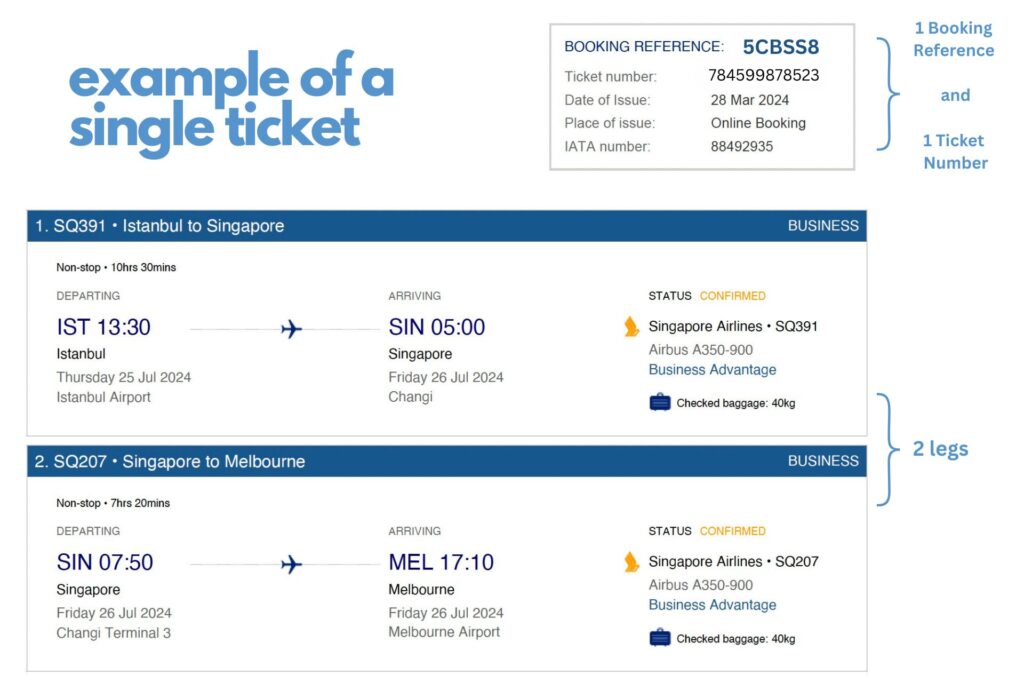
Key features of a single ticket:
- Seamless Luggage Transfer: When you have a single ticket, your luggage is typically tagged to your final destination. The airline takes care of transferring it between connecting flights. You usually don’t have to recheck your bags, even if you have a layover or change planes.
- Protected Connections: If your first flight is delayed and you miss your connecting flight, the airline is responsible for rebooking you on the next available flight at no extra charge. Your entire journey is treated as one trip, so the airline ensures you reach your final destination.
- One Booking Reference: A single ticket has one booking reference or confirmation number. This makes it easier to manage your flights, check in, and track your itinerary.
- Travel with One Airline or Alliance: A single ticket usually involves travel with one airline or multiple airlines that are part of the same alliance (like Star Alliance or Oneworld). This helps streamline the transfer of luggage and connections.
Separate Tickets
In contrast, separate tickets involve booking each flight separately. If you have separate tickets, your flights are not connected. You may need to collect and recheck your luggage at the connecting airport. Additionally, if you miss your connection, the airline is not obligated to help you. They treat each ticket as an independent journey.
What is a separate ticket?
A separate ticket refers to when you book two or more flight segments on different reservations or booking references. This means that each leg of your journey is considered a separate trip, and there is no official connection between the flights, even if they are on the same day or by the same airline.
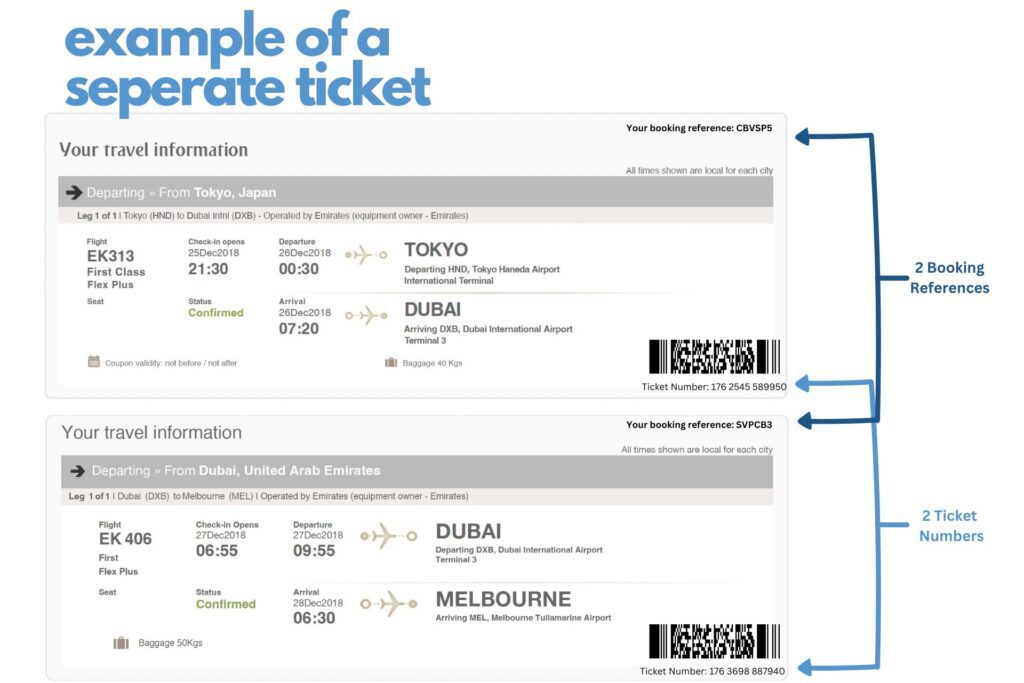
Key Features of Separate Tickets:
- Luggage Handling: When traveling on separate tickets, you typically need to collect your luggage at each layover and recheck it for the next flight. Even if you are flying with the same airline or within the same alliance. The responsibility for transferring luggage usually falls on you because the airlines treat the flights as separate journeys.
- No Guaranteed Connection: If your first flight is delayed and you miss your second flight, the airline on the second ticket is not responsible for accommodating you. You would need to purchase a new ticket or pay fees to rebook, as each flight is treated independently.
- Multiple Check-ins: You might need to check in for each flight separately, depending on the airlines and airports involved. This adds extra steps and can take up time during a layover.
- Potential Border Control or Customs: If your separate tickets involve international flights, you may need to go through customs and immigration at each layover. Especially if the stopover requires entering the country. This can also mean rechecking your luggage after going through customs.
- Airline Alliance Membership: Even if both flights are with airlines that are part of the same alliance (like Star Alliance or Oneworld), separate tickets usually mean you won’t get the benefit of automatic baggage transfers or protected connections.
If you have separate tickets for different flights, you might have to recheck your bags. Even if you are flying with the same airline.
Example of Seperate Tickets
I recently faced this situation when traveling from the Greek island of Amorgos back to Australia. On my way back, I took Aegean Airlines from Athens to Istanbul. I then connected with Singapore Airlines A350-900 from Istanbul to Singapore and onwards from Singapore to Melbourne. Even though both airlines are part of the Star Alliance, I had two separate tickets.
I had booked the Athens – Istanbul ticket through Aegean Miles and I had booked the Istanbul-Singapore-Melbourne ticket through Krisflyer Miles. (I actually used velocity points to upgrade on Singapore Airlines)
Initially, the agent at the Athens counter informed me that it wasn’t possible to tag my luggage through to Melbourne. This was because I had separate tickets. However, after a few minutes of explaining my situation and pleading, she finally agreed to tag my bags through. I was relieved, as I only had a three-hour layover in Istanbul. I wanted to explore the Turkish Airlines Business Lounge at Istanbul Airport. Dealing with customs and security checks is exhausting.
If you are in a similar situation and flying on separate tickets, it’s always worth asking the agent at check-in if they can tag your luggage through to your final destination. Especially if the airlines are part of the same alliance.
3. CHECK AIRLINE ALLIANCE / CODE SHARE PARTNERS
When flying with airlines that are part of the same airline alliance—such as Star Alliance, Oneworld, or SkyTeam—your luggage is typically transferred seamlessly between connecting flights, even if you switch airlines during your journey.
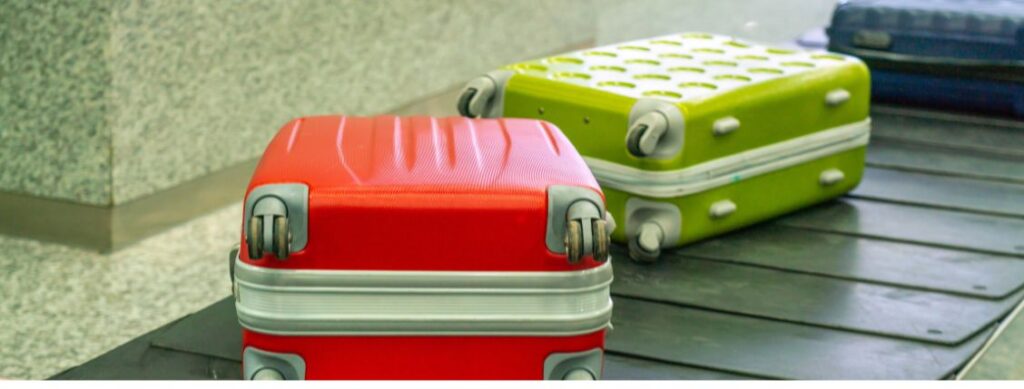
This is because alliance members & code share partners have agreements in place to streamline the transfer of checked baggage between partner airlines. This allows your bags to be checked through to your final destination at the start of your journey. It is particularly helpful for international travel. Passengers may switch carriers within an alliance without needing to collect and recheck their luggage at connecting airports.
However, passengers should confirm this service during check-in, especially if they have separate bookings or are traveling on codeshare flights.
Here is the list of Alliance Members:
Star Alliance (25 members): Aegean, Air Canada, Air China, Air India, Air New Zealand, ANA, Asiana Airlines, Austrian, Avianca, Brussels Airlines, Copa Airlines, Croatia Airlines, Egypt Air, Ethiopian, Eva Air, LOT, Lufthansa, Shenzhen Airlines, Singapore Airlines, South African Airways, Swiss, Air Portugal, Thai, Turkish Airlines, United.
One World (15 members): Alaska Airlines, American, British Airways, Cathay Pacific, Finnair, Iberia, Japan Airlines, Malaysia Airlines, Qantas, Qatar, Royal Air Maroc, Royal Jordanian, Sri Lankan Airlines, Fiji Airways, Oman Air
SkyTeam (20 members): Aerolineas Argentinas, Aeromexico, Air Europa, Air France, China Airlines, China Eastern, Czech Airlines, Delta, Garuda, ITA Airways, Kenya Airways, KLM, Korean Air, Middle East Airlines, SAS, Saudia, Tarom, Vietnam Airlines, Virgin Atlantic, Xiamen Air.
Can I request to collect my luggage on a long connection?
Yes, you can usually request to collect your luggage during a long connection, but this also depends on several factors:
- Stopover Duration: If your layover is long, usually 12 hours or more, some airlines may allow you to retrieve your luggage. That’s even if it’s supposed to be transferred automatically. You can make this request when you check in for your flight.
- Airline Policies: Some airlines will return your bags on long layovers if you ask. However, on certain itineraries, (especially those where the stopover is part of a connecting international flight), the airline might prefer to transfer your luggage automatically to the next flight, even if you’re spending the night at the stopover. If this is the case you should arrange to have an overnight bag with you with your essentials.
- Visa Requirements: Some countries may not issue visit visas on arrival for you to exit the airport. Retrieving your luggage and re checking in, is part of an immigration process. You will go through customs and passport control. You must check these details before you commence your journey.
If you know you’ll want your luggage during a long connection, it’s best to confirm with the airline when you check in. Let them know you’d like to collect your bags. Especially if you plan to spend the night during the layover or leave the airport.
I have done this on many occasions both with Singapore Airlines and Emirates. In general long stopovers allow me to explore and enjoy the city. Its also a great way to freshen up for the rest of my journey.
If you are travelling with Emirates, try and stopover in Dubai for 24 hours for free.
How Do I Know If My Luggage Will Be Transferred?
To know whether your luggage will be transferred during your connecting flight, check your flight details when booking. If your flights are on the same ticket, the airline should automatically transfer your luggage.
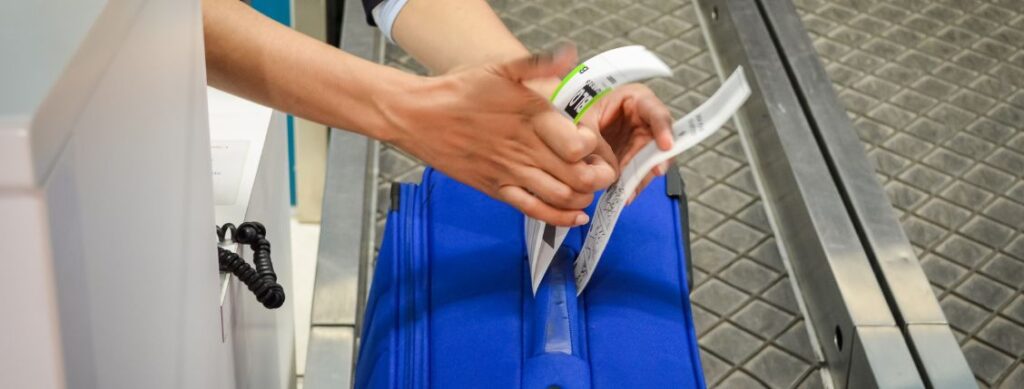
Your baggage claim ticket at check-in will usually show the final destination for your luggage. If it shows your final destination, it means your luggage will be transferred automatically.
Your luggage is being transferred automatically
If your luggage transfers automatically then follow these steps at the airport:
Follow the Signs for Transit Passengers: Upon arrival at the transit airport, look for signs directing you to the transit or connecting flights area. This is usually separate from the area where passengers collect their luggage.
Check Your Boarding Pass: Make sure you have your boarding pass for your next flight ready. You may need to present it to airport staff or security.
Go Through Security: If your connection involves an international flight, you may have to go through security screening again. Be prepared to remove your shoes, belts, and any electronics as required.
Find Your Departure Gate: Look for the departure information displays to find your next flight’s gate number and any updates regarding boarding times. If you have enough time, you can also explore the airport amenities.
Wait for Your Next Flight: After you’ve gone through security, find a comfortable spot near your departure gate and wait for your flight to be called.
Stay Updated: Keep an eye on the departure boards for any changes to your flight status, including delays or gate changes.
In cases where you have separate tickets, it’s best to ask the check-in agent directly if your luggage can be tagged through to your final destination. From my personal experience even though I had separate tickets, I was able to get my luggage tagged through after some discussion with the agent. It’s always worth asking!
Your luggage is NOT being transferred
If your luggage is not being transferred automatically then you would need to do this:
1. Follow the signs to passport control/baggage claim
2. Clear immigration
3. Collect your luggage
4. Clear customs
5. Exit and find your way to the checkin counter of your next flight. (Be mindful of terminal changes)
6. Check in your luggage and retrieve your boarding pass
7. Go through security
8. Enter the airport secured area and find your departure gate and wait for your next flight.
Packing Wisely
Additionally, you can prepare for the possibility of rechecking luggage by packing wisely. Having an ultimate travel packing list can help streamline your packing process, so if you do need to collect and recheck your bags, you’re ready.
Learning how to pack light is also key, as it makes handling your luggage easier if you need to go through the process of retrieving it during a layover.
If you’re a frequent traveller, especially one who enjoys flying business class or first class free, you might encounter situations where rechecking luggage can be avoided altogether. By flying with airlines within the same alliance, like I did with Aegean and Singapore Airlines, there’s usually a higher chance that your luggage can be tagged through.
Summing Up
So, do you have to recheck bags on a connecting flight? The answer depends on several factors, as mentioned above. In many cases, if you’re on a single ticket, your luggage will be transferred automatically. However, if you are traveling on separate tickets or through airports that require customs checks, you may need to collect and recheck your bags. Understanding the difference between non-stop and direct flights is also important.
To avoid any confusion, it’s always best to double-check with your airline at the time of booking and again at the check-in counter.
Whether you’re flying internationally or domestically, knowing how your luggage will be handled can save you a lot of stress and time.
With new regulations coming into effect in 2025 & 2026, it’s wise to review the updated visa waiver requirements for the UK ETA and European ETIAS. Many countries, including Australia and the USA, now require online applications to enter the UK and European nations. This applies even if you need to recheck your luggage or are just transiting. Thailand also requires a new digital arrival card (TDAC) within 3 days of flying, for all passengers going through immigration.
Safe travels!

